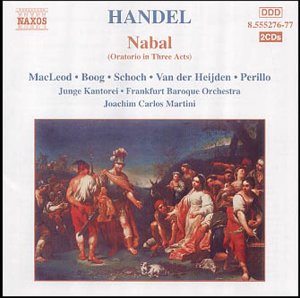Nabal is a curiosity from 1764. It has words by Thomas Morell and others, with music
taken from various works by Handel, with recitatives and perhaps one air by
John Christopher Smith Jnr. It was a commercial venture seeking to tap into a
continuing demand for Lenten oratorios by Handel after 1759, the year of his
death. A few of his sacred works had been revived in his last years, and
Nabal seems to perpetuate this tradition of musical archaeology. Handel
had collaborated with Morell as librettist for The Choice of Hercules
and for The Triumph of Time and Truth, both of which revived
pre-existent music by the Master. We need not condemn, therefore, Morellís
attempts to prolong the aesthetic of that collaboration after 1759. With
regard to the creation of Nabal, Morell appears the prime mover, with
Smith, an experienced musician under Handel's tutelage and direction, as music
arranger, director, and composer of the recitatives.
Importantly for lovers of
Handel's music, Nabal represents something of special interest: Morell
sought to arouse interest in the treasures in Handel's works, other than the
oratorios, which had not been heard for some time. Nabal is thus the
first attempt after Handel's death to develop interest publicly in the
composerís opera music. The Christian dedication in Greek text on the
front page of the wordbook for Nabal says "He is not dead having died",
though it is conceivable that Morell also intended it to refer to Handelís
music. The choice of musical numbers shows sensitivity on the selectorsí part
towards the riches that Handel had left behind.
Morell was Handel's final
librettist and author of more librettos for the composer than any other. With
his unique insight into the composerís world, he was able to provide a new
context for old arias, duets and choruses. No accompanied recitatives from the
operas or oratorios found their way into the Ďnewí work they relied on the original surroundings for their meaning Ė and the music
considerably determined Morellís choice of verse form, metre, diction, and
syntax from which to make a viable narrative. He provided English words for
Italian arias with ease, adapting with some facility the operasí Italian
iambics to their English counterpart, including careful placing of Handel's
decoration of Italian verbs or abstractions on an appropriate English
equivalent or sound.
Nabal has no pretensions. It has enough light-hearted numbers and contrasting
contemplative ones to provide a pleasant, if short, evening in the theatre.
The text makes no attempt to plumb the depths of human nature Ė the peculiar
territory in the oratorios of Handel and his librettists working together.
Reading twenty first-century dramatic values into Nabal misses the
point. We are much more aware of Handel's operas and oratorios than were
Morell's contemporaries, and we have probably heard some of the composerís
works more frequently than he ever did. To blame Morell for 'poor' words and a
lack of 'drama' contorts his prime concern, which was to hear some agreeable
music in a theatre. Nabalís performance in 1764 allowed some of its
audience their first opportunity to hear an orchestra play numbers which had
previously been available in printed score only.
The story of Nabal is derived from 1 Samuel 25, which might be
essential reading for us in order to get the gist, but not for Morell's
audience, who knew their Bible much more thoroughly than we do today. Musical
delight mixes uneasily (for us) with stiff Protestant doctrine. For the
often-penurious Morell, however, the hoped for income stream did not flow from
Nabal, and though he made a further attempt with Gideon in 1769,
after that there was no more on the libretto front from him.
The Story
ĎNabalí means Ďfoolí in Hebrew, and the story of this rich landowner who requites evil
for Davidís good and then dies of a stroke provided Morell with just enough
incident to contextualise the musical selection from the operas and oratorios.
He illustrated the Biblical theme of a personís duty to repay good with good
and how the land represents Godís relationship with man. Simple situations
were contrived for singers to display contrasting emotions in the voice.
Part 1 of Nabal deals with the Lord's goodness to man and manís
gratitude for the boon. Contrast with such grace is provided by Nabal's
country pleasures, which are carnal and not religious. Part 2 sets up a
confrontation between David's emissary Asaph and Nabal. Asaph pleads for food
to ease the famine in David's land; it is a gift requested in return for the
past favours of protecting Nabal from his enemies and not plundering his
estate while doing so. Nabal rejects the obligation, questioning David's
authority and right of expectation, and thus God's law of righteous
reciprocation. The chorus of Nabalís attendants (farmers?) celebrates the
productivity of their sheep. Meanwhile, Abigail, Nabal's wife, "united to a
Churl", yearns for a life of spiritual comfort. She is warned by a shepherd of
the approach of David's army bent on revenge for Nabal's ingratitude. Aware of
David's plight, her ploy is to approach him "Charg'd with Provisions" and
plead that Nabal's people should not suffer on account of their master. Her
ploy appeases David's anger.
Part 3 begins with
Nabalís death agony (Smith's recitative here is reminiscent of Purcell's cold
music in The Fairy Queen). His death is announced and his attendants
reflect on the "slow Degrees [of] the Wrath of God". Abigail asks David for
protection. (She is announced as a "relief" in Martini's version, though for
Morell she is Nabalís "Relict".) Her demeanour engages David's impressionable
emotions, love ensues, and the oratorio ends with a celebration of the "Thrice
happy, happy Pair". The "Thrice happy Sheep" in Part 2 and the loving pairís
threefold happiness testify that God's creatures are finally in harmony with
the Lord.
The Performance
This is the first recording of Nabal. Filling a gap is all very well, but the
sadness of this recording is that it misrepresents Handel, Morell, and Smith.
Is Naxos cashing-in on the upsurge in interest in Handel's music? Perhaps
their commercialism is no different from Morell and Smithís, yet this is a
low-key performance by youthful voices in a work which needs all the help it
can get. And neither is the performance an accurate rendering of Morellís
intentions (I have not accessed Smithís autograph score, so cannot comment on
the musical arrangement). Morellís wordbook for Nabal notes those airs
and duets that were to be given repeats of the A section, but Joachim Carlos
Martini, the conductor, adds repeats where they are not marked in the original
wordbook. What is worse, horror to relate, Martini adds a whole raft of ballet
music, a genre utterly alien to a Lenten oratorio in English. Morell the
parson would not have countenanced ballet in a sacred work.
The singing does not get off to a good start and no improvement follows. Knut
Schoch is a weak David. Though his voice is tenorino, a voice
especially suited to the softer passions, he does not muster sufficient
feeling in the airs to render them persuasive. David's description of the
Lord's gift of manna (using Grimoaldo's "Prigionera ha l'alma in pena" in
Rodelinda) comes across as merely sounding the notes rather than acting
out the situation. It has to be said that for all performers on this recording
no one item is praiseworthy, though Maya Boog as Abigail supplies a pleasantly
light and bright soprano throughout, with some tasteful decorations in
repeats. But the weakest link is Stephan MacLeod's Nabal, which fails to
convey any notion of villainy. His deficiency is assisted by the intrusion of
organ continue for his recitatives. It seems to be acceptable these days to
accompany anything remotely Christian with an organ, but surely not an
unrepentant Nabal. The sound is awful because its sobriety clashes with
Nabalís nastiness. Martini gives him a buckshee da capo in "Still fill the
Bowl" ("Finche lo strale", Floridante) which prolongs our aural
agonies. Francine van der Heijden competently sings Asaph, and Linda Perilloís
Shepherd is also acceptable.
Then there is the chorus, Junge Kantorei. Their irregular phrasing in "The
Righteous shall be had" ruins one of Handel's most lyrical choral movements,
and they labour breathily with Morell's Christian paradoxes in the chorus "The
Lord, our Guide" (Joseph), failing to point the words and thus the
meaning. The chorus is sometimes either early or late on its entry. As for
Martiniís conducting, the interludes of dances, though irrelevant nonsense,
are spiritedly executed. And an organ accompanies the pastoral air ("Replicato
al ballo" (Il Pastor Fido and The Triumph of Time and Truth)
which should sound "Gay and Light". This whole scene in Part 2 lacks the
Hedonism Morell intended and therefore falls considerably short of what Morell
and Smith must have hoped for. By the way, Morell notes that the first
da capo in the piece should be the air "Sing we the Feast" ("Bella sorge",
Arianna).
The orchestral sound of the Barockorchester Frankfurt is slender. Why is it assumed that Baroque music
requires an 'authentic' thinness of string sound? It doesn't. Handel's band
was large, accused of being noisy (Pope's The Dunciad IV gives some
evidence for this). Martiniís oboes are too often indistinct, and in the
chorus the whole wind band is not sufficiently assertive. Oddly, the organ
does not support the choral parts (and was arguably used in the pastoral
choruses in The Triumph of Time and Truth, but not here). The harvest
scene in Part 2 lacks zest Ė and where are the horns?
Oh, the pity of it all. I suppose we should be grateful to hear Smithís recitatives and ďWhen Beauty
Sorrowís Livery wearsĒ (music by Smith?). The CD gives no information on the
work or on Smithís part in the enterprise. Had Martini's role been curatorial
(to play the notes and words as written by Handel, Morell, and Smith) we could
have celebrated his achievement, but as presented on this CD his efforts are
to be regretted.


